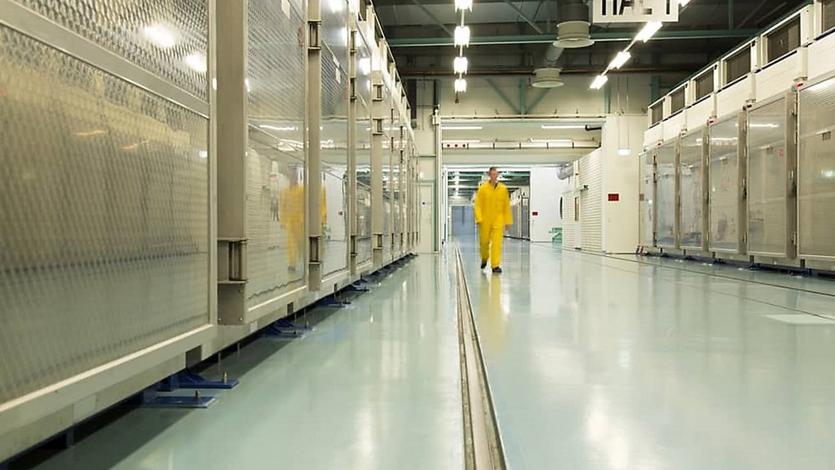 A handout picture released by Iran's Atomic Energy Organization on Nov 6, 2019, shows the interior of the Fordow Uranium Conversion Facility in Qom, in the north of the country. (HO / ATOMIC ENERGY ORGANIZATION OF IRAN / AFP
A handout picture released by Iran's Atomic Energy Organization on Nov 6, 2019, shows the interior of the Fordow Uranium Conversion Facility in Qom, in the north of the country. (HO / ATOMIC ENERGY ORGANIZATION OF IRAN / AFP
TEHRAN - Iran's Supreme Leader Ayatollah Ali Khamenei said on Monday that Iran will increase its uranium enrichment with the change of the country's needs, official IRNA news agency reported.
"Iran will not stay limited to a (uranium) enrichment of 20 percent. There is the possibility of increasing enrichment up to 60 percent in accordance with the country's needs," Khamenei said.
However, "Iran is not pursuing the production of nuclear weapons," the top leader noted.
The Joe Biden administration repeatedly said that if Iran returns to full compliance with the 2015 Iran nuclear deal, formally known as the Joint Comprehensive Plan of Action (JCPOA), the United States would do the same. But Iran insisted its compliance would only take place once US sanctions were removed
In January, Iran launched 20-percent uranium enrichment process as part of Iran's Strategic Action Plan to Counter Sanctions which was approved by the parliament in December 2020.
ALSO READ: Iran starts producing 20% enriched uranium
On Monday, the US Department of State reaffirmed the willingness to engage with Tehran over the nuclear issue, downplaying new threats by the Iranian leadership to boost uranium enrichment.
State Department spokesperson Ned Price said in a daily press briefing that the United States is willing to engage the Iranians in the context of the P5+1, namely the United States, Britain, France, China, Russia, as well as Germany.
Tehran has yet to make a formal response to talks with P5+1, said Price. "We certainly hope the Iranians will be willing to be there."
"We are not going to respond in specific terms to hypotheticals, to posturing," Price said in response to Khamenei's comments about increasing Iran's uranium enrichment up to 60 percent.
"What we are going to do is to reaffirm the proposition that is on the table," he added. "The United States is willing to meet with the Iranians to hash out these difficult complex questions."
Price also commended recent efforts made by the International Atomic Energy Agency (IAEA) to engage Iran on verification issues, while expressing concerns over Iran's ending implementation of Additional Protocol, which allows snap IAEA inspections.
The UN nuclear watchdog reached a temporary understanding with Iran over the weekend on the verification of the latter's nuclear program.
According to the IAEA, Tehran would cease implementing the Additional Protocol but would continue to allow "necessary monitoring and verification" for up to three months.
"There is less access, let's face it. But still we were able to retain the necessary degree of monitoring and verification work," IAEA chief Rafael Grossi told reporters after his visit to Tehran.
Grossi said this temporary agreement would allow other political discussions at other levels to take place.
Last week, the United States signaled its readiness to engage with Tehran over the nuclear issue, combining several goodwill gestures toward Iran.
The United States had eased travel restrictions on Iranian diplomats assigned to the UN and rescinded the so-called "snapback" UN sanctions against Iran unilaterally declared by the previous administration.
The Joe Biden administration repeatedly said that if Iran returns to full compliance with the 2015 Iran nuclear deal, formally known as the Joint Comprehensive Plan of Action (JCPOA), the United States would do the same. But Iran insisted its compliance would only take place once US sanctions were removed.
In response to the US withdrawal from the nuclear deal in 2018 and the reimposition of sanctions, Iran has suspended implementing parts of its obligations under the deal.
READ MORE: Diplomats: IAEA found uranium traces at 2 Iran sites
The parliament's law also mandated the Iranian government to stop implementing the IAEA's additional protocol from Feb 23.


